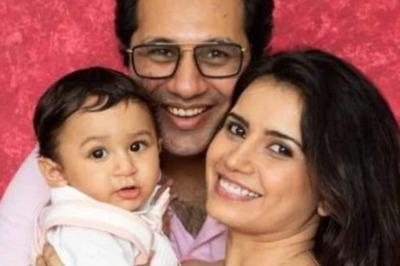
views
Fort Pierce (Florida): On a Monday afternoon in June 2017, Renee Holland was draped in an American flag at Philadelphia International Airport, waiting for a soldier she had befriended on Facebook.
The married 56-year-old had driven two hours from Delaware to pick him up. Their blossoming online friendship had prompted her to send him a care package and thousands of dollars in gift cards. She also wired him $5,000 for plane tickets to return home.
Now she was looking for a buff, tattooed man in uniform, just like in his Facebook photos. But his flight was not on the airport arrivals board. A ticket agent told her the flight didn’t exist.
From there, Holland said, it was a daze. She walked to her car, with “Welcome Home” written on the windows, and sobbed. She had spent much of her family’s savings on the phantom soldier. “There’s no way I can go home and tell my husband,” she remembered telling herself. She drove to a strip mall, bought sleeping pills and vodka, and downed them.
The man in the Facebook pictures had no idea who Holland was. His real identity was Sgt. Daniel Anonsen of the Marine Corps, and he had joined the social network a decade earlier to keep in touch with friends and family in Maryland. Now he was contending with dozens of Facebook impostor accounts using stolen photos of him at the gym, at his brother’s wedding and in Afghanistan.
“For every one that I deleted, there was 10 more that were popping up,” he said. “It turns my stomach.”
Holland and Anonsen represent two sides of a fraud that has flourished on Facebook and Instagram, where scammers impersonate real American service members to cheat vulnerable and lonely women out of their money. The deception has entangled the US military, defrauded thousands of victims and smeared the reputations of soldiers, airmen, sailors and Marines. It has also sometimes led to tragedy.
The scheme stands out for its audacity. While fraud has proliferated on Facebook for years, those running the military romance scams are taking on not only one of the world’s most influential companies, but also the most powerful military — and succeeding. Many scammers operate from their phones in Nigeria and other African nations, working several victims at the same time. In interviews in Nigeria, six men told The New York Times that the love hoaxes were lucrative and low risk.
“Definitely there is always conscience,” said Akinola Bolaji, 35, who has conned people online since he was 15, including by posing on Facebook as an American fisherman named Robert. “But poverty will not make you feel the pain.”
Facebook has long had a mission to “connect the world.” But in the process, it has created a global gathering place where the crooks outnumber the cops.
For digital criminals, Facebook has become a one-stop shop. It has plenty of photos of American service members. Creating an impostor account can be easy. Facebook groups for single women and widows are full of targets. Scammers can message hundreds of potential victims. And they congregate in their own Facebook groups to sell fake accounts, Photoshopped images and scripts for pulling off the cons.
“There are so many people out there that are lonely, newly divorced, maybe widowed,” said Kathy Waters, head of a group called Advocating Against Romance Scams. “Everybody wants somebody to love and to listen to them and hear them. And these scammers know the right words to say.”
There are no exact figures on how many service members and civilians have been affected. The FBI said it received nearly 18,500 complaints from victims of romance or similar internet scams last year, with reported losses exceeding $362 million, up 71% from 2017.
Facebook said it removes impostor accounts with the help of software, human reviewers and user reports. Its software also scans for scammers and locks accounts until owners can provide proof of identity. It has a video warning people of scams.
Facebook said it requires people to use their real identities on its sites. To eliminate impostor accounts, it has invested in technology and more human reviewers. The company works with the authorities to prosecute scammers. Billions of fake Facebook accounts have been blocked over the past year, the company said, though its estimate for the number of active fakes has steadily risen to about 120 million. It declined to disclose a figure for Instagram.
“That job is not finished and we are committed to sharing our progress,” Facebook said in a statement.
Kim Joiner, a deputy assistant to the secretary of defense who oversees the military’s social media accounts, said her team works with Facebook to remove impostors and was pleased with the company’s response. “I’m absolutely satisfied,” she said.
When shown that searches by The New York Times for three top American generals on Facebook and Instagram had yielded more than 120 impersonators, Joiner said it was “disturbing.” She said she did not know why the fakes were not eradicated.
“I mean, the numbers are astounding,” she said.
To her friends and family, Holland was known as trusting and impulsive. Born in Philadelphia, she had spent time in Arizona and Missouri, working as a gardener and in an auto shop. She met her fifth husband, Mark Holland, when she offered him a ride off the side of the road.
In 2001, she moved to Delaware to care for her sick mother. When her mother died in September 2016, Renee Holland found herself depressed and with free time. She noticed her sister glued to her phone, scrolling through Facebook. So she bought a smartphone, too, and created a Facebook profile.
A few weeks later, Holland got a Facebook message from a stranger. The profile showed a man in uniform named Michael Chris. He told her he disarmed bombs in Iraq.
Holland said she initially felt uneasy, but the conversation flowed. Chris told her about life at war. She made him laugh.
“He kept saying, ‘You’re really funny. And you make it easier for me just to know that somebody is at home that I can talk to,’” she said. “How cool is this that I could really make somebody feel better?”
Over several months, their relationship deepened. Holland said she felt motherly. Chris began calling her “my wife.”
What Holland did not know was that the man in Chris’ photos was actually Anonsen — and that his images were all over the internet.
Mostly searching variations of his name, The Times found 65 profiles on Facebook and Instagram that used Anonsen’s photos. When The Times reported the fakes to the sites, 24 were removed over more than six months.
Many more accounts have used Anonsen’s photos with different names. One used the name Michael Chris — and began messaging Holland in late 2016.
Several months into their online chats, Chris asked Holland for money. She bought him iTunes gift cards so, he said, he could buy more minutes on his cellphone. She sent money for beer for his birthday. And she paid for medicine for what he said was a sick daughter, Annabelle, in California.
In June 2017, she wired $5,000 for Chris and a friend to fly to Philadelphia from Iraq. Chris promised to pay her back when he got there. He never arrived.
That was when Holland took the sleeping pills and vodka. Days later, she awoke in a hospital bed. “You open your eyes, and the person you didn’t want to face the most is sitting next to you,” she said. “Mark.”
Mark Holland knew about his wife’s Facebook friend. An Army Airborne veteran himself, with tours in Honduras and South Korea, he once helped Renee Holland prepare a care package of snacks, underwear and foot powder for Chris. (The package was returned.) Now he said he realized his wife’s relationship with this man had gone further than he understood.
“I had a lot of anger,” Mark Holland, 53, said in an interview last year. “But I also had a little bit of compassion because I knew how bad she felt.”
When Renee Holland returned home from the hospital, her relationship with her husband and her then 82-year-old father, whom she was caring for, was strained. One person kept talking to her: Chris.
“He wanted to make it up to me,” she said. “He was going to sit there, look my husband in the eye and tell him how sorry he was and pay him back.
Chris swore to her that he had been delayed by a military operation. There were soon new photos of Chris injured in war, documents showing he was due big insurance payments and promises she would be reimbursed for more than she had lost.
She just needed to get him home.
Twice more, Holland sent money for airfare, partly with credit cards, without her husband’s knowledge. Chris never showed.
The Hollands lost $26,000 to $30,000. To start afresh, they moved to Fort Pierce, Florida, last year.
But the strains remained. Mark Holland was arrested on domestic violence charges in August 2018, according to a police report. Renee Holland dropped the charges.
On December 23, 2018, Mark Holland shot and killed Renee Holland and her father at their new home. Mark Holland then turned the gun on himself.
Jack Nicas c.2019 New York Times News Service



















Comments
0 comment